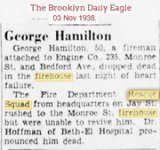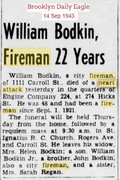The family of a New York City firefighter who died in 1935 after fighting a blaze in Manhattan has filed court papers to force the FDNY to declare that his death occurred in the line of duty. Thomas O?Brien died on Oct. 28, 1935, at the age of 48 after he returned to his Engine Company 3 following a fire a day earlier at a paint store in Manhattan, court papers explained. O?Brien complained to his supervisor of feeling faint and was told to go to bed in the firehouse, rather than seek medical help, the papers stated. O?Brien was found dead in his bed at the engine company the next morning, according to his grandson.
https://www.firerescue1.com/fdny/ar...family-files-papers-seeking-LODD-recognition/
I do not believe FF O'Brien is the only FDNY firefighter to die in quarters after fire duty and not be considered a LODD. I have seen death notices and obituaries in old newspapers which describe similar circumstances - the firefighter returned from a fire, did not feel well, and died in quarters or at home shortly after the fire. FF George Hamilton, Engine 235, is an example. He died in quarters from a heart attack and is not on any FDNY LODD memorial roll:

FDNY firefighters used to spend most of their time on duty in their firehouses. Criteria for a LODD must have been different if a death was considered from "natural causes" or undetermined. Firefighters were also seen by medical doctors and often sent home when sick to recover. I believe seriously injured department members were placed in "LSS" status for limited service for a period of time in the 1950s and 1960s. If they subsequently did not recover and passed away, they seemed to be awarded LODD honors. I do not know criteria or time period but it does seem that policies have changed over the years.
Based upon current medical knowledge, current Department standard policies and the circumstances of respective deaths, it would seem appropriate that the Department should recognize, honor and remember individuals who died on duty or became seriously ill on duty - if appropriately substantiated - who served in eras without masks and took tremendous beatings without modern medical technology and knowledge. There are probably legal and financial risks and costs in doing so, but these individuals should at least be recognized.
https://www.firerescue1.com/fdny/ar...family-files-papers-seeking-LODD-recognition/
I do not believe FF O'Brien is the only FDNY firefighter to die in quarters after fire duty and not be considered a LODD. I have seen death notices and obituaries in old newspapers which describe similar circumstances - the firefighter returned from a fire, did not feel well, and died in quarters or at home shortly after the fire. FF George Hamilton, Engine 235, is an example. He died in quarters from a heart attack and is not on any FDNY LODD memorial roll:

FDNY firefighters used to spend most of their time on duty in their firehouses. Criteria for a LODD must have been different if a death was considered from "natural causes" or undetermined. Firefighters were also seen by medical doctors and often sent home when sick to recover. I believe seriously injured department members were placed in "LSS" status for limited service for a period of time in the 1950s and 1960s. If they subsequently did not recover and passed away, they seemed to be awarded LODD honors. I do not know criteria or time period but it does seem that policies have changed over the years.
Based upon current medical knowledge, current Department standard policies and the circumstances of respective deaths, it would seem appropriate that the Department should recognize, honor and remember individuals who died on duty or became seriously ill on duty - if appropriately substantiated - who served in eras without masks and took tremendous beatings without modern medical technology and knowledge. There are probably legal and financial risks and costs in doing so, but these individuals should at least be recognized.
Last edited:

